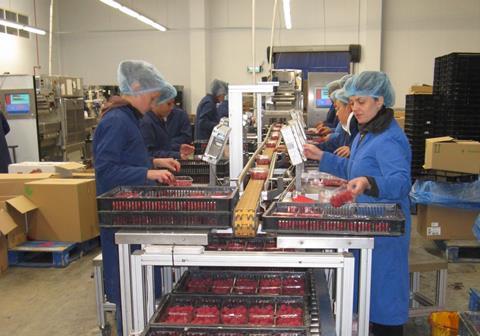Recommendations from report by Growing Kent & Medway will be implemented to address skills challenges facing agri-food sector in the region from autumn 2022
A new draft strategy to address the skills needs of the horticultural and food sector in Kent has been published by the research, innovation and enterprise cluster Growing Kent & Medway and is now open for consultation.
Growers, processors, manufacturers, distributors, and technology companies in the food and drink value chain are encouraged to have their say on the organisation’s Workforce 2030 strategy.
The recommendations from the report will be implemented to address the skills challenges facing the sector from autumn 2022.

The six main issues addressed by the Workforce 2030 strategy are:
1. Recruitment and retention of labour.
2. Improving current curriculum and qualification pathways.
3. Creating new sector-specific engineering qualifications and training.
4. Bespoke leadership and management training programmes for the industry.
5. Supporting innovation in areas like automation, sustainability and quality.
6. Improving communication and engagement between employers, education and individuals.
Businesses are invited to submit their feedback through an online survey or attend a virtual discussion session on the following days:
- · Monday 18 July, 12-2pm
- · Wednesday 17 August, 8.30-9.30am
- · Tuesday 13 September, 8.30-9.30am
The consultation closes on 13 September 2022.
Steve Matthews, Growing Kent and Medway’s skills champion, who researched the issues with sector companies and developed the strategy, said: “Our research confirms that a multi-pronged approach is required to address the future skills needs of an increasingly high-tech and innovative sector.
“Collaboration between industry and further education is critical to help highlight the exciting career pathways available, and to develop appropriate training and educational qualifications and apprenticeship programmes to upskill the workforce of tomorrow.”
Dr Nikki Harrison, programme director of Growing Kent & Medway, added: “The strategy recognises two key factors. The sector is becoming more consolidated, with highly innovative, larger-scale businesses and bigger workforces. These companies have greater pulling power for new recruits, sophisticated retention schemes, and can offer attractive career pathways.
“The food market is also driven by cost pressures and high-quality requirements. Automation and new technologies are increasing in importance to balance these competing needs, requiring new competencies throughout the workforce.”
Tom Hulme, director of A C Hulme & Sons, a mixed farm operating in east Kent since 1946, said access to work-ready, skilled labour is one of the biggest challenges and opportunities facing the horticultural sector.
“I would encourage businesses across the supply chain to have their say on this important consultation. This is an opportunity to put in place practical support to ensure our businesses are able to thrive, with the right skills and staff coming through.”



